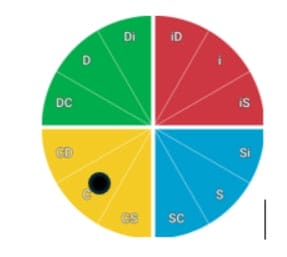
The Conscientiousness (C) style in the DISC personality framework excels due to its analytical ability and commitment to precision along with its attention to detail. These individuals maintain stability during chaos by staying calm and following logical and methodical approaches. The C personality type remains composed but possesses their own limits of endurance. Pressure reveals that they display an intriguing combination of resilience and rigidity in their reactions.

The Conscientiousness (C) style stands apart by looking inward for strength rather than seeking external support. We’ll investigate how C styles manage stressful situations and discover what makes them unique during critical moments.
The Everything DiSC C Style at a Glance
Within the DISC framework Cs operate as the primary analysts and strategists. They function best within organized systems, factual information, and meticulous attention to detail which allows them to support teams that prioritize quality above appearance. The C personality type maintains a composed demeanor because of their independence and level-headed nature but stressful situations can cause these stable individuals to develop unique behavioral habits. These individuals hide their emotions but their responses to stressful situations reveal predictable patterns when you know how they operate.
How The C Type Personality Reacts Under Pressure
Under pressure C’s maintain their composure by entering a state that safeguards their control and competence needs. Here’s how they tend to respond:
Withdrawal & focus on work when confronted emotionally? C personality types prefer to withdraw from stressful situations rather than participate when stress arises. They choose to avoid heated discussions by immersing themselves in manageable and tangible tasks such as spreadsheets and reports. This withdrawal represents a calculated move toward an area where they have control rather than an act of avoidance. Their dedication to work serves as protection from emotional turmoil while they restore their stability through productive activities.
A C’s fine attention to detail becomes a harmful double-edged weapon when they face pressure. Under pressure they begin to notice problems throughout every aspect of their environment, including processes and other people’s work as well as their own. Constructive feedback can devolve into nitpicking or evolve into outright criticism. They aren’t trying to be mean-spirited when they criticize everything because they believe that control will return through their actions. They expose weaknesses in order to protect their personal standards of quality even though this approach creates conflict.
C’s have a natural tendency towards perfectionism which becomes amplified to extreme levels when they face stress. They fixate on small details and cannot proceed until all aspects of the task meet their exacting standards. Too much analysis makes them stuck because they continuously doubt and refine their work. Their pursuit of perfection results in progress slowing down to a near standstill which leads to frustration for themselves and their waiting audience. C’s perceive the release of minor details as a betrayal of their core values.
Although most people find change difficult to handle, C’s struggle when changes occur too quickly or remain unclear. They require time to understand and strategize before making changes while having a comprehensive plan available to them. Exposing them to a chaotic mix of unstructured changes will cause them to firmly resist because of the fear of failure. This resistance does not represent pure stubbornness but rather signifies a request for stability. When they lack the opportunity to deliberate things properly, they end up making rushed errors which represent their greatest fear.
How The C Type Personality Differ from Others
When you compare these behaviors to those of Influence (I) and Steadiness (S) styles it becomes immediately apparent how different they are. An I Style will approach a group to express their emotions or use charisma to handle stress because they need social interaction and affirmation. An S depends on established relationships to find comfort while they prefer someone dependable to steer them through situations. C’s however, go it alone. They find their own solutions during tough times by analyzing situations within themselves instead of seeking validation from others. Their self-sufficiency serves as their strength, but without release or management, it can also function as their weakness.
Navigating the C’s Stress Response
Analyzing the responses of C’s to stressful situations enables us to develop effective support strategies. Allow them to process their thoughts independently without demanding emotional reactions they cannot produce. Explain changes with logical reasoning and give them additional time to adjust. When they criticize more intensely, they recognize it as stress manifestation rather than intentional harm and guide them back to the main objective. When their perfectionism causes delays, tell them that completed work holds more value than perfection yet expect resistance to this idea.
Everything DiSC C Style: Driving Forward
Pressure drives the Everything DiSC C style to demonstrate both self-reliance and precise execution. C style personalities focus on work through withdrawal and utilize critique as a means to manage stress while they overanalyze details for perfection and oppose changes to maintain stability. These reactions create an impression of distance and inflexibility because they represent how C personalities cling to their core values of precision and organization. Understanding their patterns allows us to connect with C’s in their current state and transform their stress into a pathway for development. The C style’s methodical approach stands as a testament to the fact that a patient and consistent effort often leads to success in a world obsessed with speedy solutions.


